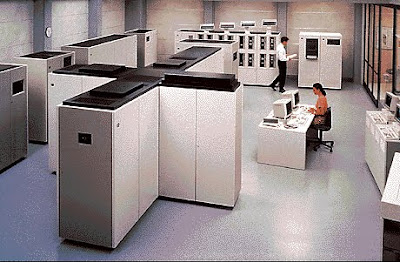When I saw this at first, I said to myself: how good it would be to have a speedy access to really everything. Then I had me a few stray thoughts. Why the sudden philanthropic move from Google - the folks that certainly know where the money is? Just to sell broadband connection - a business that carries a lot of competition, which competition is not going to leave the field just because Google decided to play. And I think that if I were a guru, I could have guessed the answer: Google is going to get us back to the centralized computing - to the olden days of the glass citadels and end users deprived of that multipurpose toy called PC on their desks.
I am old enough to remember the uphill fight IBM had keeping its mainframes alive. Followed by derisive laughter, the old "dinosaurs" of centralized computing left (or almost left) the scene, to be replaced by seemingly agile, small and easily configurable UNIX, Linux and MS servers. Everyone nowadays has on his/her table a PC or a laptop that complements the picture and, besides, provides some free of charge entertainment.
No matter that in a few years it suddenly became clear that the new "server farms" are not much cheaper and certainly more complicated in maintenance, creating all kinds of reliability and downtime issues.
No matter that the quantity of programmers required to develop and maintain the code mushrooming from the impossible variety of OSs and technologies kept mushrooming too - with appropriate impact on many a corporate budgets.
No matter that proliferation of desktop workstations caused another strain on same budgets due to expense and complications of maintenance and support and, on top of it, these desktop workstations appeared to be excellent desktop playstations as well, with a huge negative impact on productivity...
And more, but let's go back to Google. Some time ago Google and several other companies started promoting the idea of cloud computing. In a nutshell, the definition of this idea:
Cloud computing describes a new supplement, consumption and delivery model for IT services based on the Internet, and it typically involves the provision of dynamically scalable and often virtualized resources as a service over the Internet.Here how its' illustrated:
 Does it remind you (or, at least, some of you) something you may have seen years ago? No? Then try to replace in your imagination that central "cloud" by something that looks approximately like this:
Does it remind you (or, at least, some of you) something you may have seen years ago? No? Then try to replace in your imagination that central "cloud" by something that looks approximately like this: Of course, the "dinosaur" in the picture doesn't look precisely like one that Google and others have in mind, but the idea is the same: get the computing and computer geeks back where they belong - into the glass houses, get the end users back where they belong - to the work they are getting paid for. Of course, it's a crude description of the trend, but as a rough approximation of it it will do for now.
Of course, the "dinosaur" in the picture doesn't look precisely like one that Google and others have in mind, but the idea is the same: get the computing and computer geeks back where they belong - into the glass houses, get the end users back where they belong - to the work they are getting paid for. Of course, it's a crude description of the trend, but as a rough approximation of it it will do for now.But one thing is sure: to fully deploy the framework of cloud computing, Google needs the communications with end users be as smooth and as speedy as possible - just as if the glasshouse were located in the basement of the company building where the user is located. And this is, most probably, the explanation of why Google is suddenly so concerned with the throughput of your and mine Internet connection...
So I hope you can see now where it goes. And do you know what? I wouldn't shed a tear for the oh so lame world of the so called "client/server" paradigm. Let it die.
Welcome back, cloud computing.


0 comments:
Post a Comment